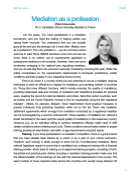MAY 28, 2019 INADR Mediation as a profession Miglėė Zukauskaitėė Ph.D. Candidate, Vilnius University, Mediator & Trainer Let me guess. You have participated in a mediation tournament, and you liked the feeling of helping parties and seeing them reconcile. You understand that you are actually good at this and you are striving to do it more often. Maybe, even as a profession? The only problem is – you do not know where and how to start. Since INADR members come from all over the world, there is no uniform set of requirements applicable to professional mediators in all countries. However, there are some tendencies emerging in the national laws regulating mediation, and you should take them into account if seriously considering choosing this path. While this article concentrates on the requirements implemented in European jurisdictions, similar conditions are likely to apply in your respective home country. First of all, check if a country where you are planning to act as a mediator requires individuals to enter an official list or register for mediators, as a growing number of countries do. These lists have different functions, which include ensuring the quality of mediations, providing systemized data and contacts of mediators and mediations providers for potential users, keeping the record for national statistics and others. Note that certain countries, such as Austria and the Czech Republic, foresee a fine for fraudulently using the title ‘registered mediator’. Others, for example, Belgium, have implemented more practical measures to prevent individuals from practicing mediation while not on the list. There only mediation settlement agreements which emerge from mediation conducted by a registered mediator can be homologated by a court for enforcement. These registers of mediators are, without a doubt, beneficial for the users and the overall quality of mediations in the respective country. However, you, as an individual willing to conduct mediations officially, might need to fulfill certain conditions before entering such a list. These conditions are primarily related to proper training, passing an examination, education or age requirements and good repute. Training. If you have participated in a mediation competition, there is a good chance that you have already been trained by a coach or as a part of your school curriculum. However, such training is rarely enough to enter the list of professional mediators. Many national legislators require to prove that a candidate has undergone training with a licensed training provider, which base its training on an approved training program, consisting of both, theoretical and practical parts. Before choosing a mediation training provider make sure that the offered duration of the training is in line with the national requirements in the country. The exact number of hours required varies across the countries and usually range between 30 !5
